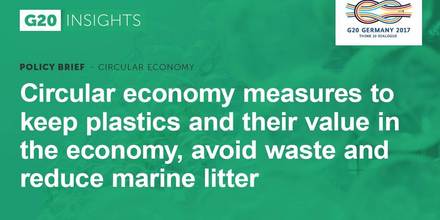Green Economy
Our Work
Latest in Assessing nature's multiple values
-

IEEP at T20 Summit 2017
Patrick ten Brink presents G20 policy briefing urging leaders to take action on marine litter by adopting circular economy.
-
Beyond GDP Newsletter – December 2015 edition out now
The latest edition of the Beyond GDP newsletter explores indicators for a greener economy and for green growth.
-
Nature, Health and Jobs: IEEP at Green Week 2015
Drawing on recent work by the Institute, IEEP’s Patrick ten Brink will present at Green Week 2015 on Jobs & Growth through Green Infrastructure (3 June 2015 - 16:30-18:00, Session 2.2) and on Health and Social Benefits of Nature and Biodiversity Protection (4 June 2015 - 09:30-11:00, Session 3.3).
-
New IEEP Programme on the Green Economy
IEEP strengthens its focus on the Green Economy with a new dedicated programme, coming on stream as from May 1st.
-
Beyond GDP Newsletter – March 2015 edition out now
The latest edition of the Beyond GDP newsletter looks closely at the Inclusive Wealth Index (IWI) 2014 and discusses the challenges of developing sustainability indices.How might a ...
-
Finland launches its ecosystem service assessment
Finland joins the ranks of countries that have carried out a dedicated assessment of their ecosystem services. Like similar studies elsewhere, the assessment concludes that ecosystem services underpin the country’s social and economic well-being and should therefore form the basis of the transition to a green economy in Finland.
-
The value and social significance of ecosystem services in Finland (TEEB for Finland)
TEEB for Finland presents the results of a national assessment of the socio-economic importance of ecosystem services in Finland. It provides a review of the country’s most relevant ecosystem services while also considering opportunities and tools for their sustainable management.
-
Transforming our approach to water and wetlands
Thursday 12th December: IEEP and UNEP are hosting two webinar discussions on the values of water and wetlands and how to mainstream these values into policy-making in order to promote wise use and management.
-
Assessing the social and economic benefits of protected areas in Europe
A webinar on social and economic benefits of protected landscapes was organised by Europarc Atlantic Isles on 20 November. IEEP’s Marianne Kettunen kicked off the event by a European overview and some key considerations of assessing benefits in practice.
-
Sectoral resource mobilisation to implement global biodiversity targets
There is an urgent need to find sufficient resources to enable developing countries to implement the global targets for biodiversity by 2020. Financing the conservation and sustainable use of biodiversity from different sectoral funding flows can complement global biodiversity financing.
-
New book coming soon: Social and Economic Benefits of Protected Areas
A new book by IEEP researchers will be published on 15 August offering a comprehensive introduction to the socio-economic benefits of protected areas and providing step-by-step guidance on identifying, assessing and valuing the various benefits they provide.
-
Natural capital in a Nordic context
A report for the Nordic Council of Ministers reviewing five different approaches to natural capital accounting and exploring their links with biodiversity and ecosystems.
-
Incorporating biodiversity and ecosystem service values into national strategies and action plans
This guidance document has been prepared to support practitioners of National Biodiversity Strategies and Action Plans to update their plans to incorporate biodiversity and ecosystem service values. Six in depth country case studies provide common lessons of good practice.
-
Webinar: Incorporating biodiversity into national strategies and action plans
IEEP has just produced a roadmap and guidance document to help practitioners to incorporate biodiversity and ecosystem values into their NBSAPs. See case study examples and tune into the webinars on June 5 and 7.
-
New report: The Economics of Ecosystems and Biodiversity for Water and Wetlands
This new IEEP-led report presents insights on the importance of wetlands in delivering ecosystem services that are needed to support human life, and also for people’s livelihoods and the world’s economies. The report shows that demonstrating and using the values of ecosystem services related to water and wetlands can lead to better informed, more cost-effective, and fairer decision- making.
-
The Economics of Ecosystems and Biodiversity for Water and Wetlands
This new IEEP-led report presents insights on the importance of wetlands in delivering ecosystem services that are needed to support human life, and also for people’s livelihoods and the world’s economies. The report shows that demonstrating and using the values of ecosystem services related to water and wetlands can lead to better informed, more cost-effective, and fairer decision- making.
-
Socio-economic importance of ecosystem services in the Nordic countries
New TEEB-inspired regional assessment (published on 31 January) shows that nature and its ecosystem services are of high socio-economic significance for the Nordic countries. In order to be truly sustainable, Nordic economic systems need to build on a more comprehensive appreciation and understanding of the value of natural capital.
-
What do we mean by Green Economy?
What is the Green Economy? What policy actions can contribute to achieving it? And how have EU-funded research projects supported these actions?
-
Green Economy in the European Union
Elements of the green economy concept are relatively well integrated in EU strategic documents - but the focus is on achieving green/sustainable growth, rather than achieving a ‘green economy’.
-
Nature and its role in the transition to a Green Economy
Published timely before the Rio+20 Conference, this executive summary of a paper by IEEP highlights the role of nature in the transition to a green economy.
Highlights
-

Sectoral resource mobilisation to implement global biodiversity targets
There is an urgent need to find sufficient resources to enable developing countries to implement the global targets for biodiversity by 2020. Financing the conservation and sustainable use of biodiversity from different sectoral funding flows can complement global biodiversity financing.
